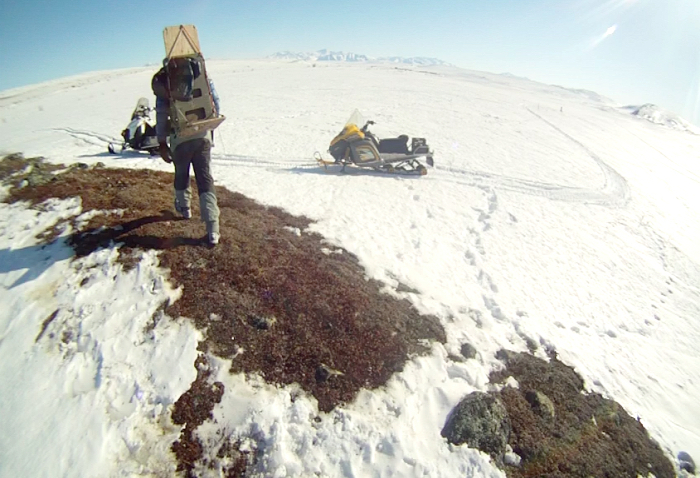Meet Team Squirrel - Cory Williams
Today we processed the three female squirrels we caught yesterday and we we had planned to do some trapping here at Toolik this afternoon, but it was cold and Cory didn't see many squirrels when he did a round on the snowmachine. Instead, I spent some time in the lab entering data on the five squirrels we brought back yesterday, plus two that were recaptures yesterday that we identified, weighed, and released. We each keep a list with us of the color-coding on the eartags of captured individuals, so we don't bring them back to the lab again, but I spent some time reorganizing these lists to include the sex of the individual, the location captured, and the number of the ear tags in case the colored wire fell off, which it sometimes does. This should make it easier to know who is who when we go back to Atigun tomorrow.
I had some free time this afternoon, so I decided to check out the fitness facility at the station. It felt strange to wear my inside running clothes and shoes with a hat, gloves and jacket to get over to the right building, and it was colder today than normal. But it was nice to listen again to my history podcast and see if I could burn off the desserts I've eaten over the last ten days. Or the three I might have had tonight... After dinner I headed back to the sauna and then to the dining hall. Some of my new friends were playing a board game, so I hung out for a bit and then came back to my room to try to get an early night of sleep, though that is unlikely. It is almost 10pm and the sun is still up.
I wanted to take a chance to introduce you to Cory Williams, the Principal Investigator, or PI, for this expedition. He is the one who interviewed me for the PolarTREC program, and I'm grateful that he chose me for this adventure. I asked Cory to tell us a little bit about himself. Let's see what he had to say.
 Cory walking back to the snowmachine with a schlepper for transporting squirrels on his back
Cory walking back to the snowmachine with a schlepper for transporting squirrels on his back
"First off, I'm Canadian. I grew up in British Columbia, spending most of my youth much more interested in sports than in science - I've always been really into the outdoors and sports like downhill skiing, snowboarding, and mountain biking. As a university student I started working on a variety of wildlife projects - mostly studies of birds (ducks, grebes, shorebirds, geese) - and decided this was the direction I was interested in pursuing. After I finished my bachelors degree at Simon Fraser University, I spent time working on seabird projects and traveling to Australia, New Zealand, and Bali. In Australia I spent a month and a half in a remote camp with two other people working on a study of fur seals, mostly doing observations of marked individuals but also deploying satellite tags and capturing seals that had become entangled in fishing gear so that we could cut it off of them."
 Cory with a captured skunk.
Cory with a captured skunk.
"After about eight months of traveling, I ran out of money in Australia and decided I needed to get a job - this is how I ended up in Alaska. I was hired as a technician on a seabird project on Kodiak Island and ended up staying on to do my PhD studying the foraging ecology and stress physiology of tufted puffins. I then spent a year teaching at Simon Fraser University and University of Alaska Southeast before starting work on small mammals (ground squirrels and tree squirrels mostly). Since starting in Flagstaff I've also been working with skunks."
Bonus fun facts:
1. Cory has been bitten - on the nipple - by a tufted puffin.
2. He has has been sprayed by skunks on more than one occasion, though his graduate student has suffered more on this front.
3. Cory has also been bitten, on the hand, by an arctic ground squirrel.
4. Despite these minor misadventures, Cory really loves what he does.


Add new comment